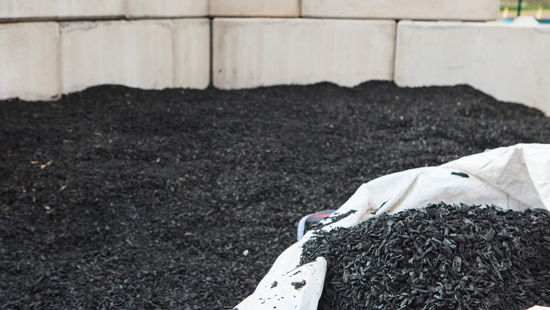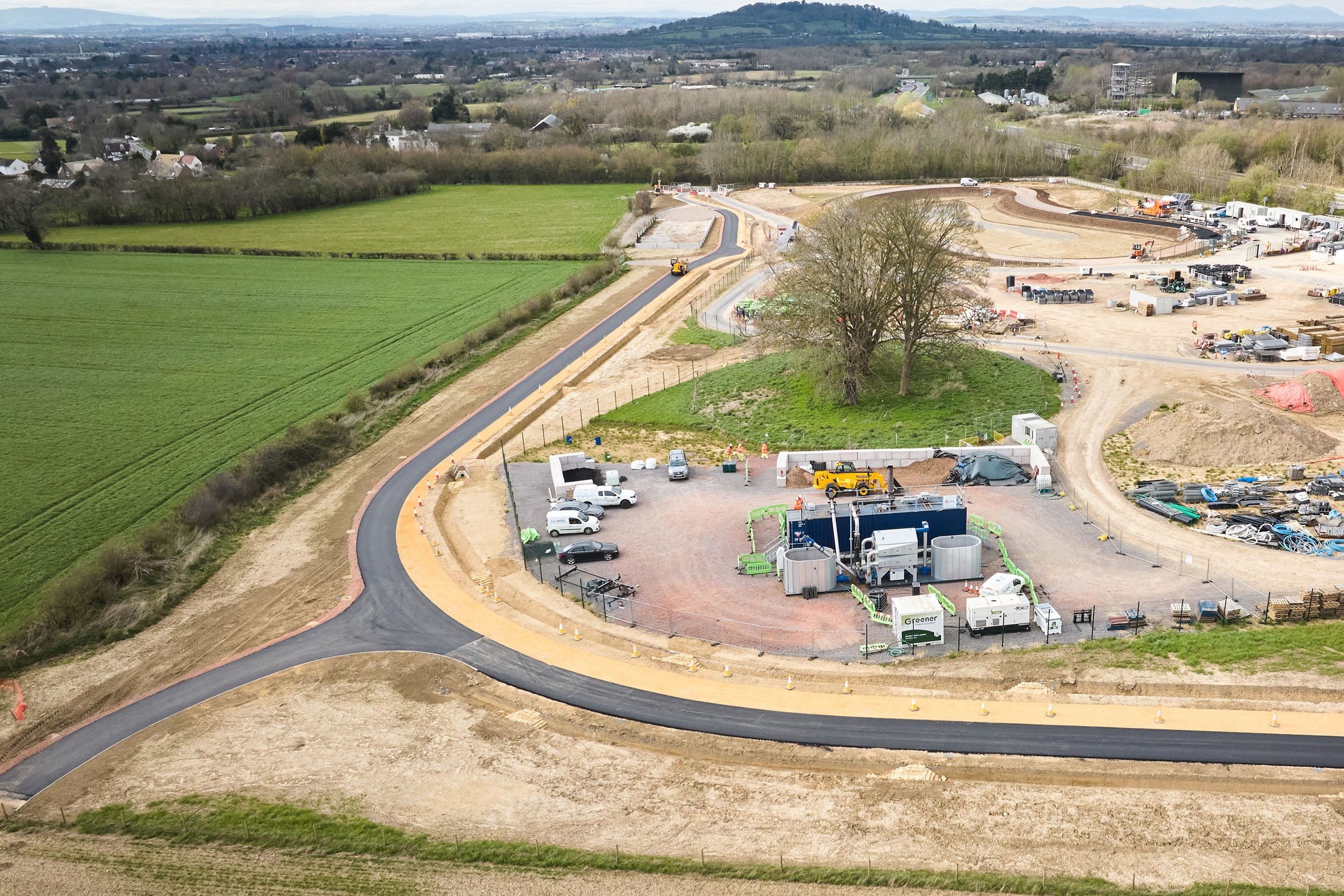National Highways funding innovative new Kier and TerrAffix trial to cut carbon

An innovative UK-first trial exploring how vegetation removed from highway projects can be reused to make significant carbon savings is being trialled on a National Highways scheme.
Trialled by Kier and TerrAffix on the A417 Missing Link scheme in Gloucestershire, biochar – a charcoal-like material produced by burning organic matter at extremely high temperatures – was produced from vegetation removed by the scheme, turning it back into a product that can be reused to fertilise new plants and catch microplastics.
The study produced five tonnes of biochar on site, which is a saving of 13 tonnes of CO2 – the equivalent of roughly five flights from London to Perth.
The next stage of the trial is to use the biochar in different elements of the A417 project, turning waste from the project into a material that is being used to support the project.
- Landscaping: Biochar will be mixed into the soil when planting thousands of new trees, which will help them establish and grow quicker, while removing more carbon from the atmosphere.
- Green Bridge: Biochar be used in the construction of the green bridge, which is going to be the largest green bridge in the UK at the time of building. On the deck of a green bridge, manmade gels are normally used to help retain water in dry periods to stop plants dying. Instead, biochar will be used to store and retain the water improve resilience.
- Microplastics: The biochar will be used to remove microplastics from highway runoff in the highway drainage system.
On completion of the trial, a case study will be developed detailing benefits, improvements and lessons learnt.
This study could then be shared across National Highways and the supply chain to see if it’s implementation can help reduce carbon across future builds.
The study is being co-funded from National Highways’ Environmental and Wellbeing Designated Fund and Kier, the main contractor on the A417 project.

CAPTION: Biochar is a charcoal-like material produced by burning organic matter at extremely high temperatures
Celine Acard, Senior Project Manager for National Highways, said: “We’re always looking to improve how we design and build our major projects, especially in relation to the environment and our commitment to net zero.
“This trial is incredibly exciting because it means we can look in detail at new ways or repurposing and reusing site materials to cut down on our environmental impact.
“By investing in innovation, we can explore new technology and solutions to protect and enhance the environment and increase biodiversity benefitting communities that live alongside our roads.”
Kier Highways head of environment & sustainability, Matt Tompsett said: “We’ve been working with TerrAffix to prove that using the vegetation cleared as part of the A417 scheme to create biochar for reuse in the construction of the road is feasible.
“In major highways projects we dispose of high levels of vegetation, so to be able to reuse this could be a fantastic example of applying a circular economy model to help reduce carbon and waste, while using a carbon capture and storage technique which means the carbon absorbed by the vegetation will be locked away, instead of releasing it back into the atmosphere.”
Sion Brackenbury, TerrAffix Technical Director, added: "The benefits of an on-site solution are immense. These start with the need to remove vegetation from site, achieving lorry loads of carbon savings, but creating biochar also prevents the slow carbon release to the atmosphere that would ordinarily take place through traditional vegetation processing, such as composting or mulching.
“An additional benefit is the circular economy solution achieved through the reuse of material at a site. This offers soil enhancement opportunities and the promotion of biodiversity.”

CAPTION: The biochar process, as trialled on the A417 Missing Link (Credit: TerrAffic)
Biochar is created through the process of pyrolysis, when organic materials such as trees or vegetation are turned into solid carbon under extremely high temperatures in the presence of little or no oxygen.
This biochar is then reused across the project in new elements such as soil, where it is proven to enhance plant growth, improve nutrient exchange and water retention.
This increases the chance of successful habitat establishment, provides climate change resilience, improves the soils’ ability to sequester CO2 and reduces reliance on synthetic materials such as swell gels.
Using pyrolysis to manage site biomass is a pioneering approach to capturing carbon in construction and reusing it onsite.
The process of pyrolysis will reduce carbon emissions through carbon capture, reduction in vehicle movements and reduction in purchased materials, contributing to National Highways’ carbon reduction targets set out in the Net Zero Plan.
It will also support National Highways objectives to design, build, maintain and operate roads more efficiently and effectively by incorporating a site-won material into the design, reduce waste, reduce carbon emissions and reduce maintenance on the soft estate.

CAPTION: The study produced five tonnes of biochar on site, which is a saving of 13 tonnes of CO2 – the equivalent of roughly 5 flights from London to Perth
The successful completion of this project will provide National Highways with proof of concept for this approach and could allow for the technology to be deployed across all other suitable highways schemes, supporting National Highways in their objective to deliver better environmental outcomes across all schemes.
Up to 2025, National Highways invested almost £1 billion (£936 million) from its designated funding programme. This money was allocated to four funding streams focused on making improvements that will make the biggest difference and deliver lasting benefits.
These were safety and congestion, innovation and modernisation, users and communities and environment and well-being.
For more details about National Highways’ Designated Funds programme, click here.
Notes to Editors
National Highways is the wholly government-owned company responsible for modernising, maintaining and operating England’s motorways and major A roads.
Real-time traffic information for England’s motorways and major A roads is available via the Traffic England website, local and national radio travel bulletins, electronic road signs and mobile apps. Local Twitter services are also available.
For further information please contact National Highways' press office (24hrs) on 0844 693 1448 and select the most appropriate option:
Option 1: National enquiries (9am to 5.30pm) and out of hours for urgent enquiriesOption 2: North West (9am to 5.30pm)Option 3: Yorkshire and North East (9am to 5.30pm)Option 4: West Midlands (9am to 5.30pm)Option 5: East Midlands (9am to 5.30pm)Option 6: East (9am to 5.30pm)Option 7: South East (9am to 5.30pm)Option 8: South West (9am to 5.30pm)
